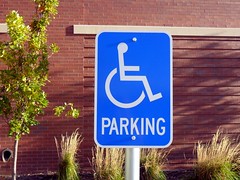 Sometimes, it takes a lawsuit to force businesses or towns to follow the laws and meet the accessibility requirements set forth in the Americans With Disabilities Act. A town in California will now begin making the the improvements that it should have implemented a long time ago. This is very good news!
Sometimes, it takes a lawsuit to force businesses or towns to follow the laws and meet the accessibility requirements set forth in the Americans With Disabilities Act. A town in California will now begin making the the improvements that it should have implemented a long time ago. This is very good news!
Parents of kids who have the types of special needs that require a wheelchair know, from personal experience, how difficult it can be to navigate through restaurants, stores, parks, and other public places if those places have not been designed to include adequate wheelchair accessibility. Things like bathrooms that are too small to fit a wheelchair into, lack of sidewalks, or stores that have their aisles stuffed full of displays can make it difficult, if not impossible, for people who use wheelchairs to shop, visit, or dine at those locations.
The Americans With Disabilities Act, or ADA, requires businesses, restaurants, and other public places, to have bathrooms that are large enough for a person to easily fit a wheelchair into. It requires there to be ramps and elevators alongside places that have stairs. It requires that sidewalks be a certain size, and that stores keep their aisles clear so that people who use wheelchairs can use them. These are just a few of the regulations.
In California, two adults, Russell Peterson and Suzanne Smiley, sued the town of Paso Robles, California, because they were unable to access parts of the downtown areas. The arguments in their lawsuit were based on the Americans With Disabilities Act. The town of Paso Robles has entered into a consent decree with the two people. The consent decree defines some deadlines by which Paso Robles must make specific improvements.
The town must build curb ramps on several of the streets, and create sidewalks where there currently aren’t any. It must create eight disabled-designated parking spaces near the park. The sidewalk ramp work will cost around $1.8 million. The establishment of the disabled-designated parking spaces will cost around $9,500. The town must also build brand new restrooms in the park that are large enough to fit a wheelchair into. That is estimated to cost nearly $550,000.
All of those costs could have been avoided if the town would have followed the regulations set in place by the Americans With Disabilities Act in the first place! It is sad that it takes the threat of a lawsuit for some places to finally decide to do what they are legally required to.
Image by William Ross on Flickr

